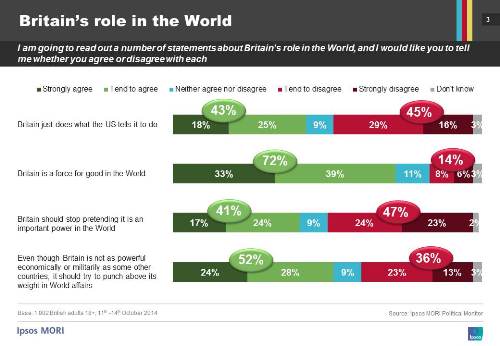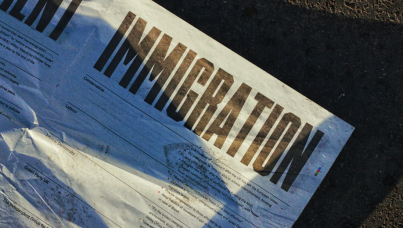Six in ten back UK military intervention against IS
The majority of the British public back intervention abroad against Islamic State (IS), primarily for humanitarian reasons, polling from Ipsos reveals. Six in ten (59%) back British armed forces intervening abroad to fight IS, comprised of 17% who think we should do so because British interests are directly threatened and 42% who back intervention because other people’s rights and freedom are threatened. One in three (34%) say we should not intervene abroad to fight Islamic State.
 When asked about the role of the British military in general, there is an even bigger majority (80%) who back intervention abroad when British interests or other people’s rights are threatened. Just under half (47%) think British armed forces should intervene abroad when other people’s rights and freedom are threatened, and 33% believe that British forces should rather intervene abroad when British interests are directly threatened. Compared to the last time this question was asked in March 2013, this represents a shift in emphasis towards intervention to protect others’ rights (up 16 percentage points from 31%), and away from intervening abroad when British interests are directly threatened (down 11 points from 44%). The changing context needs to be borne in mind though – March 2013 was at the tenth anniversary of the Iraq war and amid discussions of Britain’s role in that, while the current debate is focused more on IS in Iraq and Syria. The proportion saying the military should not intervene abroad and only be used to defend British territory is at 15%, down from 21% last March.
As may be expected given this backing for intervention, Britons see their country as a force for good in the world – and think Britain should try to punch above its weight in world affairs. Seven in ten (72%) agree Britain is a force for good in the world, while 14% disagree. While those who disagree is slightly higher than the 9% who felt that way in April 2003, following the ‘fall of Baghdad’, there is still strong belief in Britain being a force for good. Meanwhile, half (52%) of Britons think Britain should try to punch above its weight in world affairs even though it is not as powerful economically or militarily as some other countries; 36% disagree.
When asked about the role of the British military in general, there is an even bigger majority (80%) who back intervention abroad when British interests or other people’s rights are threatened. Just under half (47%) think British armed forces should intervene abroad when other people’s rights and freedom are threatened, and 33% believe that British forces should rather intervene abroad when British interests are directly threatened. Compared to the last time this question was asked in March 2013, this represents a shift in emphasis towards intervention to protect others’ rights (up 16 percentage points from 31%), and away from intervening abroad when British interests are directly threatened (down 11 points from 44%). The changing context needs to be borne in mind though – March 2013 was at the tenth anniversary of the Iraq war and amid discussions of Britain’s role in that, while the current debate is focused more on IS in Iraq and Syria. The proportion saying the military should not intervene abroad and only be used to defend British territory is at 15%, down from 21% last March.
As may be expected given this backing for intervention, Britons see their country as a force for good in the world – and think Britain should try to punch above its weight in world affairs. Seven in ten (72%) agree Britain is a force for good in the world, while 14% disagree. While those who disagree is slightly higher than the 9% who felt that way in April 2003, following the ‘fall of Baghdad’, there is still strong belief in Britain being a force for good. Meanwhile, half (52%) of Britons think Britain should try to punch above its weight in world affairs even though it is not as powerful economically or militarily as some other countries; 36% disagree.
 Britons are however split as to whether Britain should stop pretending it is an important power in the world and whether Britain just does what the US tells it to do. The public are split down the middle as to whether we just do as the US says, with 43% agreeing and 45% disagreeing – exactly the same proportions as said the same in April 2003. There is a similar divide as to whether Britain should stop pretending it is important; 47% disagree (exactly the same proportion as eleven years ago) while 41% agree (up six points from 35% in 2003).
Europe remains Britain’s most important relationship, according to the public, with just under half (47%) seeing the relationship as the most important of Europe, the Commonwealth and America – up from 42% in 2003. A quarter (25%) say the Commonwealth is most important, while 20% choose America – a turnaround from 2003 when America was seen as more important by 34% to 16% for the Commonwealth. When China is included as an additional option, four in ten (39%) think Europe is most important, 26% America, 17% the Commonwealth and 10% China.
Lord Hennessy, Attlee Professor of Contemporary British History at Queen Mary University London, who is discussing the results in his Caradon Lecture on ‘Britain’s Place in the World’, said:
Britons are however split as to whether Britain should stop pretending it is an important power in the world and whether Britain just does what the US tells it to do. The public are split down the middle as to whether we just do as the US says, with 43% agreeing and 45% disagreeing – exactly the same proportions as said the same in April 2003. There is a similar divide as to whether Britain should stop pretending it is important; 47% disagree (exactly the same proportion as eleven years ago) while 41% agree (up six points from 35% in 2003).
Europe remains Britain’s most important relationship, according to the public, with just under half (47%) seeing the relationship as the most important of Europe, the Commonwealth and America – up from 42% in 2003. A quarter (25%) say the Commonwealth is most important, while 20% choose America – a turnaround from 2003 when America was seen as more important by 34% to 16% for the Commonwealth. When China is included as an additional option, four in ten (39%) think Europe is most important, 26% America, 17% the Commonwealth and 10% China.
Lord Hennessy, Attlee Professor of Contemporary British History at Queen Mary University London, who is discussing the results in his Caradon Lecture on ‘Britain’s Place in the World’, said:
Gideon Skinner, Head of Political Research at Ipsos said:“The latest Ipsos figures suggest that the British people still have an appetite for the UK playing a significant role in the world. The result of the new ‘punching above our weight in world affairs’ question is especially intriguing.
Such beliefs are tempered with reservations and caution, however. Almost as many of those polled believed that Britain just does what the United States tells it to as those who disagreed.
These findings will be of particular interest in Whitehall given that the next Strategic Defence and Security Review and National Security Strategy are due in a year’s time, to the leaderships of the political parties as we move more closely into the pre-general election weather system and to both the UK’s allies and its adversaries.”
“Despite the lingering effects of the Iraq war on public opinion, the lack of support for action in Syria last year, and the belief among many Britons that the world is becoming a more dangerous place, this research shows that much of the public still think that Britain can play an important role on the world stage. But in line with other Ipsos research that shows six in ten Britons feel that that world is changing too fast, public opinion itself is not set in stone, as we see in the results that four in ten also think that Britain should stop pretending it is an important power in the world, and the recognition that there are other countries with whom Britain has important relationships.”Downloads
Technical note:
Ipsos interviewed a representative sample of 1,002 adults aged 18+ across Great Britain. Interviews were conducted by telephone 11th – 14th October 2014. Data are weighted to match the profile of the population. Baron Hennessy of Nympsfield, Attlee Professor of Contemporary British History at Queen Mary University London, will be delivering the 2014 Caradon lecture on Thursday 23 October in the Desmond Tutu Centre, The University of St Mark and St John, Plymouth.



